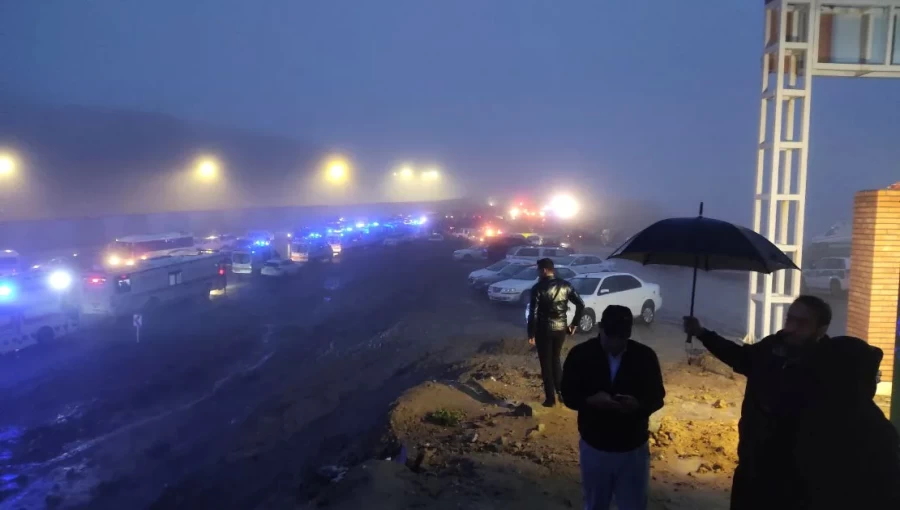
Photo: Reuters
Rescue vehicles respond to the scene following a helicopter crash carrying Iran's President Ebrahim Raisi in Varzaqan, East Azerbaijan Province, Iran, on Sunday, (May 19). Photo: Reuters
Iranian President Ebrahim Raisi, who was a year into his presidency, was killed in a helicopter crash on May 19, 2024. During his tenure, Raisi had brutally suppressed a youth-led uprising protesting repressive laws, including the compulsory hijab, and continued to crack down on dissent, evidenced by the recent death sentence of a dissident rapper related to the 2022 protests.
In a shocking turn of events, Iranian President Ebrahim Raisi and the nation's Foreign Minister Hossein Amir-Abdollahian have died in a helicopter crash, according to state media reports. The crash occurred on Sunday in Iran's remote northwest region as the officials were returning from a ceremony for the opening of a dam near the border with Azerbaijan.
Drone footage aired by state media FARS News Agency revealed the crash site on a steep, wooded hillside, showing remnants of the helicopter, primarily its blue and white tail. Along with Raisi and Amir-Abdollahian, the helicopter carried three crew members, the governor of Eastern Azerbaijan province, an imam, Raisi’s head of security, and a bodyguard.
The tragic incident triggered an extensive search-and-rescue operation, complicated by adverse weather conditions, including fog and plummeting temperatures. Assistance came from the European Union and Turkey, among others.
The death of Raisi, a conservative hardliner closely aligned with Iran’s Supreme Leader Ayatollah Ali Khamenei, is expected to exacerbate the already significant economic and political turmoil in the country. Iran has been under pressure due to youth-led protests against clerical rule and a severe economic downturn. Additionally, tensions with Israel are at a peak following recent conflicts, including Iran’s unprecedented direct drone and missile attack on Israel last month.
Vice President Mohammad Mokhber is next in the line of succession, pending approval by Khamenei. According to the Iranian constitution, Mokhber, along with the heads of the parliament and judiciary, must organize an election to appoint a new leader within 50 days.
Supreme Leader Khamenei sought to reassure the nation, stating, “People of Iran, do not worry. There will be no disruption in the work of the country.”
Ebrahim Raisi, who ascended from Iran’s judiciary to the presidency, was known for his hardline stance on dissent and human rights, drawing both domestic and international criticism. In 2019, he was sanctioned by the US for his role in the 1988 "death commission" and other human rights abuses.
Despite controversies, Raisi was seen by Iran’s ruling elite as a steadfast guardian of the Islamic Revolution’s ideals. His presidency, marked by a low voter turnout, signaled a shift towards more conservative governance, especially after the tenure of his moderate predecessor, Hassan Rouhani.
Raisi's death leaves a significant void in Iran's leadership, raising questions about the future direction of the country. With the hardline leadership facing numerous challenges, the coming weeks will be crucial in determining Iran's political trajectory and stability.
A year into his presidency, Raisi brutally quashed a youth-led uprising over repressive laws like the compulsory hijab, continuing to suppress dissent. Recently, a dissident rapper was sentenced to death for involvement in the 2022 protests.
A UN report highlighted Iran’s severe repression of peaceful protests and institutional discrimination against women, calling some actions "crimes against humanity."
In foreign policy, Raisi oversaw a significant Iran-backed show of force against Israel, with Tehran-supported groups attacking Israel and its allies since the Israel-Hamas war began in October. He rejected negotiations with the US on Iran’s nuclear program, undermining efforts to revive the 2015 nuclear deal, which Trump had abandoned in 2018. Iran then increased uranium enrichment, nearing weapons-grade levels by March 2023.
Raisi also sought to end Iran’s economic isolation by strengthening ties with China and mending relations with Saudi Arabia and the UAE. Despite some economic recovery reported by the World Bank, Iran remains under heavy sanctions, with ongoing social repression and political instability following Raisi’s sudden death.
News Sources CNN// Stay to Voice7 News for the latest updates.
END/V7N/SMA/DK/

Comment: